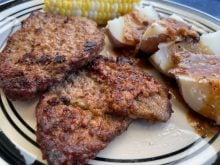It took a special kind of person to forsake the comforts of upper-class life in England at the peak of the British Empire’s strength and scratch out a new beginning on the prairie near Brandon in the early 1880s.
Percy Criddle, perhaps the unlikeliest of the early settlers, was lured with the promise of cheap land in the “Wheat Field of the World.”
He emigrated with his long-suffering wife, Alice, who was well educated and fluent in a variety of languages, including Sanskrit, and a not-so-secret German mistress, Elise Vane, along with the two women’s nine young children by him.
Read Also

Growing crops for fuel comes with challenges
Crops for sustainable aviation fuel will be the subject of much debate. Where to plant them, will farmers invest in them and how food and fuel prices will be impacted must be discussed.
The wine merchant abruptly sold his import-export business in April 1882 and booked passage for New York on the S.S. Wisconsin.
Percy kept extensive diaries that later became the subject of an entertaining book, Criddle-Diddle-de-Ensis,” written by his descendant Alma Criddle.
“I’ve been trying to get someone to make a movie out of it,” said Marguerite Cory, curator of the Sipiweske Museum in Wawanesa, Man. “There’s lots of story there.”
The museum hosts a large number of artifacts from the Criddle-Vane homestead, including Percy’s telescope.
The museum recently received a grant, which has enabled it to enlarge and preserve high quality prints of images from the original family album.
The Criddle-Vane homestead has also been made into a provincial heritage park with its own self-guided interpretive trail. The home, dubbed St. Alban’s by the family, can be toured during the summer months.
After gladly leaving their first stop in New York, which Percy described as swarming with flies, they made their way north by ferry to St. Thomas, Ont., then Sarnia and across Lake Superior by steamboat to Duluth, Minn.
From there, they took the train to Winnipeg, before finally arriving in Brandon in mid-August.
After a Sunday’s rest at the Brandon House hotel, Percy set off in a rented buckboard in an urgent search for a suitable homestead to claim.
He had less than a week to decide whether to choose a half-section of wooded land with light soil or better land on “the everlasting plain, which is enough to send one mad.
“Is it better to have poor land with lots of wood, good shooting and beautiful landmarks making one remotely happy, or rich land half drowned in wet weather, which makes one wish he were dead?” he wrote.
After purchasing a team of oxen, a stove and a couple of second-hand tents, the group headed off to their new home in the bushland, halfway between Shilo and Wawanesa.
With winter fast approaching, Percy hired two neighbours to build a cabin, since he had no skill with an axe. By early December, with the cracks between the logs chinked with lime plaster, they moved in.
The house was neither warm nor weatherproof.
“The mortar keeps on dropping from the walls in a most alarming, not to say dirty, manner. If the thaw goes on … the apartment will become rather airy,” he wrote.
They kept warm the first bitterly cold winter by huddling under blankets and around the stove.
“These Canadian stoves are abominable affairs. They burn no end of wood, smell horribly when hot and want constant attention as they are either trying to set the place on fire, or nearly out,” he wrote.
The Criddles’ lack of knowledge in practical matters no doubt added immeasurably to their discomforts.
“A horrid lot of bother we had with the chimneys at first, as whenever the wind was north … they insisted on discharging the whole of their smoke through the stoves into the rooms, thereby driving everybody who didn’t want to be smothered, out of doors.”
Life improved considerably in the later years, with tennis and golfing on their farm. They spent many Sunday afternoons on their nine-hole golf course, which boasted a pigpen as one of its hazards.
Despite choosing farm life in Canada, Percy apparently harboured a deep disdain for the work.
At 13, the eldest son, Edwy, began plowing with the oxen. The girls milked the cow, while Percy recorded the family’s struggles in his diaries, monitored the weather, played the organ and entertained guests.
It was the children, which grew to include 13, who carried the family through hard times. The boys brought in extra income working for neighbouring farms and the girls worked as domestics in Brandon.
Elise passed away in 1903, followed by Percy and Alice in 1918. The sons all went on to become successful farmers, except for Norman, who turned his interest in prairie flora and fauna into a career as a naturalist, writing and illustrating Farm weeds of Canada, in 1906.
More information on the family can be found at www.gov.mb.ca/
conservation/parks/popular_parks/criddle_vane.














